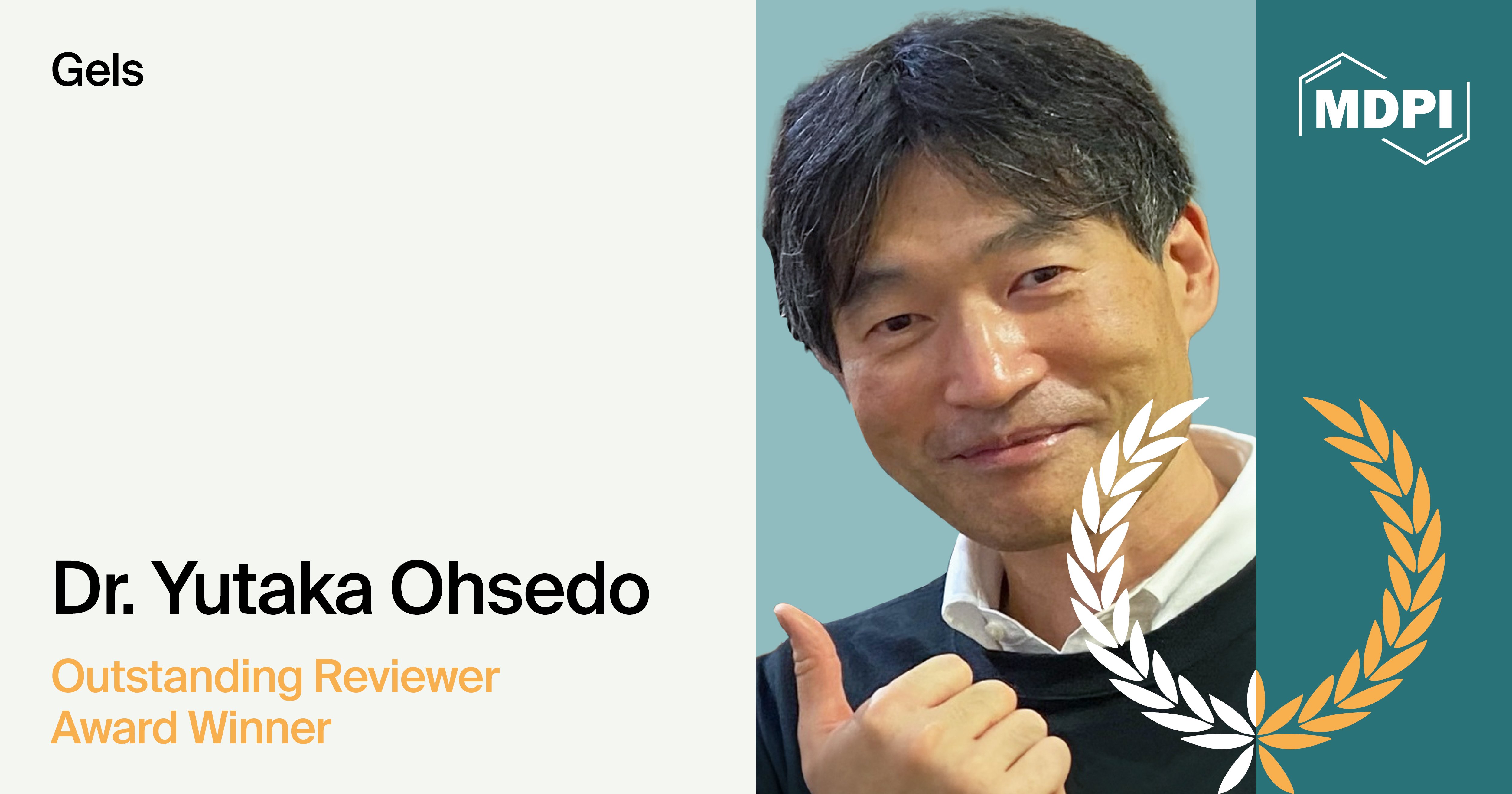
Interview with Dr. Yutaka Ohsedo—Winner of the Gels Outstanding Reviewer Award
The Outstanding Reviewer Award is presented annually to recognize reviewers who generously dedicate their time to evaluating manuscripts and who demonstrate exceptional thoroughness, professionalism, and timeliness. The winners are selected by the journal’s award committee.
We had the pleasure of speaking with Dr. Yutaka Ohsedo, Associate Professor at Nara Women’s University, Japan, recipient of the Gels 2024 Outstanding Reviewer Award, to hear his opinions and experiences with scientific research and awards.
Name: Dr. Yutaka Ohsedo
Affiliation: Division of Engineering, Faculty of Engineering, Nara Women’s University, Kitauoyahigashi-machi, Nara 630-8506, Japan
Research interests: oleogels; vegetable oils; chemistry; polymer chemistry; hydrogels; conductive hydrogels
The following is an interview with Dr. Yutaka Ohsedo:
1. What is your current research focus, and what inspired you to pursue this field?
My current research focuses on gel materials with photoactive and electroactive functionalities. These materials are soft, flexible, and often perceived as “weak”, yet I find inspiration in the challenge of transforming such weak substances into strong, functional materials. The contrast between flexibility and strength motivates me. I aim to create materials that are not only scientifically interesting but also powerful in application.
2. What motivates you to serve as a reviewer for Gels, and what do you find most rewarding about the peer-review process?
What motivates me is the honest, rigorous, and professional editorial approach of the Gels team. The editorial team’s dedication stimulates me to contribute seriously. Reviewing allows me to stay up to date with cutting-edge research, which is intellectually stimulating and professionally beneficial. I believe collaboration with such a journal contributes positively to my future as a researcher.
3. How do you balance encouraging innovation with ensuring methodological rigor in peer review? Could you share an example?
The balance begins with trusting in the honesty of authors while maintaining a commitment to rigorous scientific standards. I try to evaluate whether a study genuinely presents innovation while being transparent and grounded in precedent. One common issue I’ve noticed is when authors focus too much on presenting the novelty of their work but neglect to properly reference previous studies, which weakens credibility. I emphasize both innovation and scholarly integrity in my reviews.
4. What are your key tips for writing a high-quality review report? What makes a review truly outstanding?
For me, an outstanding review depends on honesty and fairness. A high-quality report should guide the author clearly, highlighting strengths while constructively pointing out weaknesses. Trust in the research community is essential, and I always approach the task with the belief that most authors are doing their best. A respectful and ethical tone ensures that feedback is received in the right spirit.
5. Has peer review feedback ever helped drive a breakthrough in your own research?
Yes. Through the review process, I often encounter new ideas and fresh experimental approaches, especially in the rapidly evolving field of gels. Exposure to emerging research helps me rethink and refine my own work. The knowledge gained from reviewing papers often stimulates new perspectives in my research.
6. Based on your rich reviewing experience, could you please share the common problems that authors face?
Many authors tend to underrepresent prior research, which I see as a significant issue. They often emphasize their novelty too strongly and neglect referencing existing literature. This lack of context makes the manuscript less convincing and appears less honest. Another issue is a lack of clarity and detail in the introduction, which makes it hard to understand the scope and importance of the work.
7. How has your experience been with Gels as a reviewer? What kind of support would you like to see from MDPI and the journal?
My experience with Gels has been very positive. I’ve received sufficient support from the MDPI editorial team, and the communication has always been smooth and respectful. I appreciate how Gels values its reviewers and provides recognition. While the review timelines are sometimes short, I understand the need for efficiency. If any further support is needed in the future, I know I can reach out.
8. What suggestions do you have for authors to make their manuscripts more readable and engaging?
Authors should aim to read widely and cite broadly. Understanding and referencing related work helps readers quickly see where a paper fits in the scientific landscape. It’s important to think deeply before writing and to structure the manuscript logically and clearly. A well-organized introduction, a compelling research question, and thoughtful discussion all make a paper more engaging.
9. What advice would you give to early-career researchers aiming to make a meaningful impact in their fields?
Be honest, humble, and persistent. Focus on your research goals, but always remain aware of what's happening in your field. Participate actively in the academic community: review papers, attend conferences, and collaborate. Thinking carefully before acting is key. Your contributions will grow stronger through careful reflection and engagement with others.
10. In your view, how does open access publishing benefit authors?
Open access plays a vital role in democratizing knowledge. It aligns with the core vision of academia: sharing ideas freely and globally. With open access, researchers from all over the world can read, reuse, and build upon each other’s work. I believe MDPI’s commitment to open access reflects a progressive and essential direction in academic publishing.
